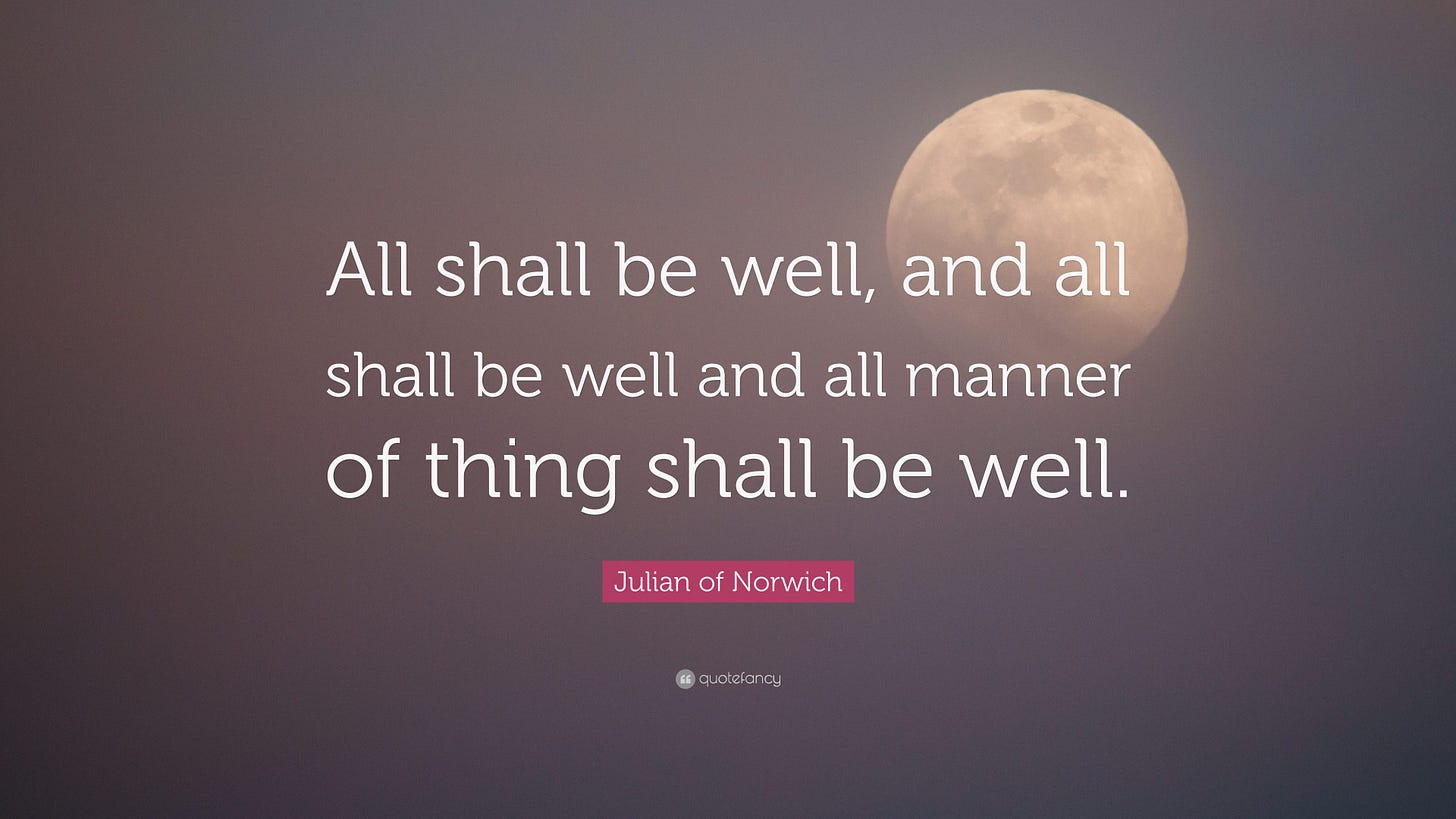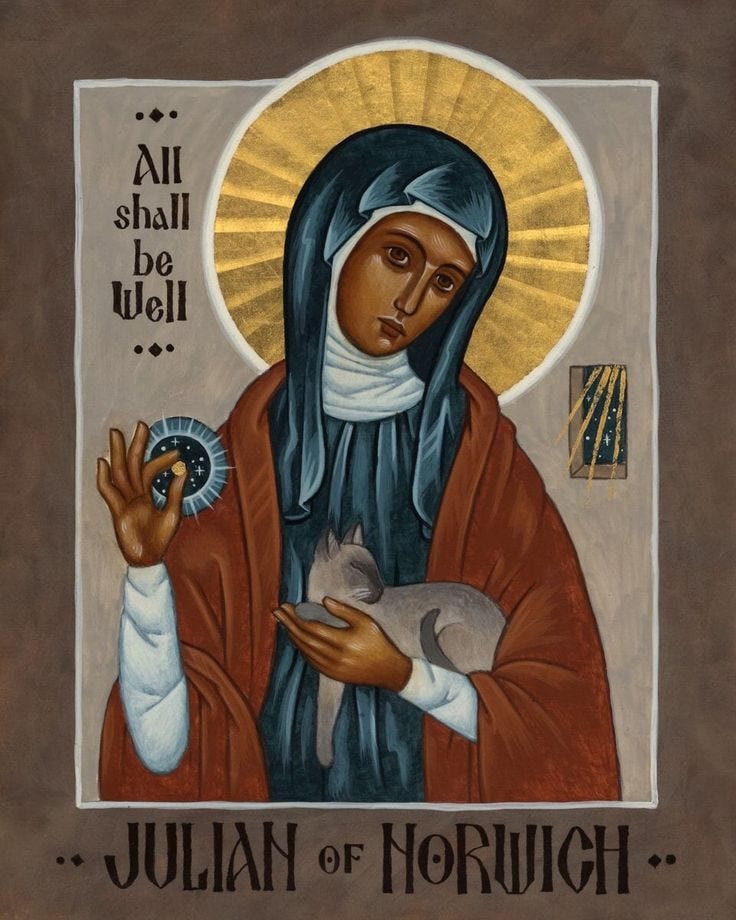All Shall Be Well?
In this economy?!
If you’ve been around Christian circles for any length of time, perhaps you’ve seen this quote before—perhaps even in this nice Instagrammable form.
It strikes one as the kind of thing an American Christian would post on social media: inspirational, hopeful, with a big dose of spiritual bypassing and inspirational scenery mixed in.
But if you’re facing a more honest moment, where it feels like the bottom of the world has fallen out, and God has turned off the lights and left the building, your genuine gut response might be:
WTF Julian of Norwich?!
Have you seen what’s happening in the world?! Have you seen how high my grocery bill is?! How many more Palestinians got killed in Gaza?! My parent’s cancer diagnosis?! All things don’t feel very well at all, thank you very much.
Decontextualized against a background of fluffy clouds, this sounds like the kind of thing a mystic sitting on a soft pillow somewhere might have come up with.
The thing is, it’s not.
As my medieval-lady-mystic loving wife reminded me, Julian of Norwich, a British anchoress during the 14th century, lived during a time of upheaval not unlike our own. Father John Julian writes in his introduction to Julian’s Revelations of Divine Love:
[Julian] saw the assassination of a king and an archbishop, and the nationwide rioting of the poor in the Peasants’ Rebellion. She lived through three sieges of the Black Death, which struck Norwich with exceptional devastation and killed over half of the population there, saw the beginning of the Hundred Years’ War between England and France, and saw the firm rock of the papacy come crashing down—first in the Babylonian Captivity at Avignon, and later in the Great Schism when for the first time there were three men each claiming to be the true pope; she watched the continuing degeneration of the monasteries from being centers of the highest sacrifice and devotion to becoming England’s greatest (and most self-aggrandizing) landlords….This was the mad, crumbling world in which this exceptional woman lived…”
It’s also important to note that Julian received her mystical visions, in which she says she heard these words “All shall be well” from Jesus, as she was lying deathly ill at the age of 30.
John Philip Newell writes about these words:
This is not naive optimism in Julian. Her revelations, or “perceptions” as she calls them, are full of the awareness of suffering. She herself lies ill during these revelations, appearing to those around her to be on her deathbed. She sees so much blood in her dreamlike awareness of Christ that at one point she says that if it had been real blood, her bed would have been flowing like a stream.
“All shall be well, and all shall be well, and all manner of things shall be well.” Julian responds to these words of divine assurance by reflecting on deeds that are done in the world and wrongs that are suffered in our lives that seem so evil that to conceive of good coming out of them is unimaginable. “I thought it impossible,” she writes, “that all manner of things should be well.” How can the deep agonies of our world be transformed?
How indeed?
It’s further important to note that for Julian, these questions did not remain at the level of abstraction. Newell further writes:
In particular Julian asks about “a certain person” in her life. She wants to know if that one whom she especially loves will be well. Will all things be well for this one?
We do not know who this “certain person” in Julian’s life was. She does not name her. Was she Julian’s daughter, mother, lover, friend? We do not know. But Julian’s question is essential. It is essential because it is a question of love.
Who are these ones who we particularly love? Our child, our lover, our parent, our friend? And what are the brokennesses in their lives that we feel deeply—brokennesses that we may not even be able to imagine being made well? “I thought it impossible,” says Julian, “that all manner of things should be well.” It is important to express the disbelief that is within us and to ask again and again about these particular ones. What about them? How can all things possibly be made well for them? And we need to keep remembering that the preciousness of these ones who are special to us is the preciousness of special ones in other families, in other countries, in other species. We need to keep remembering that our wellness belongs inextricably together. To stay in touch with brokenness—whether that be in the hidden places of our own soul or the intimacy of our family lives or the interrelatedness of our family’s journey with the life of every family and every nation—is essential in the journey toward wholeness.
In these troubled times of ours, when so much seems chaotic, and where so many are pushed toward hatred, division, and a sort of tribal warfare against others who think differently, I am taking these words to heart. I am, with Julian, hoping desperately that “all shall be well” but also being honest with my doubts that it seems impossible that all should be well. In a world that is trying to tear us all apart, I am trying to stand with and in the brokenness—my own and that of those around me—and recognizing that both our brokenness and our wellness are bound up with each other. For all to be well, mutual healing, not conquest, is the only way forward.
I currently write and share this Substack for free, but if you enjoy what you’re reading and would like to drop me a tip, I’d sure be grateful:





Thanks Chris! It was fascinating to read your post on Julian and Jen’s love of this ‘first English language woman author.’
I have also taken a deep dive into Julian studies in the past few months. It’s interesting that one of the first uses of this famous quote leaves off the first line often.
In the old English it is something like this? “Sinne is behovely, but alle
shalle be wele….” Sin refers to all the spiritual and physical pain and suffering of God’s created things. Behovely means fitting or inevitable.
Our hopefulness is in the redemption through Christ and through the “restoration of all things” that will ultimately come.
Julian has much to teach us about the implications of “God is love” that came from what God ‘showed’ her — and her decades long meditation on that love that has been preserved for us.
Indeed…. For such a time as this!
https://open.spotify.com/track/5Vm78FIZP8vAFsViUfgnO7?si=JzDDtzonRiS5ZVV5tdzAvw